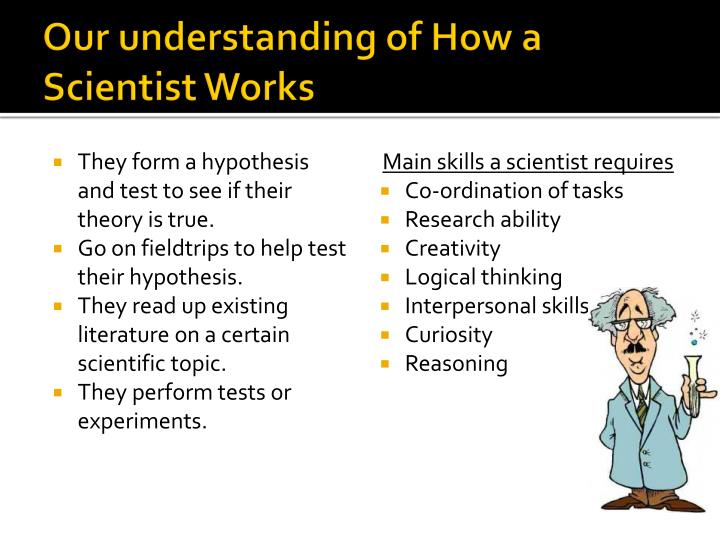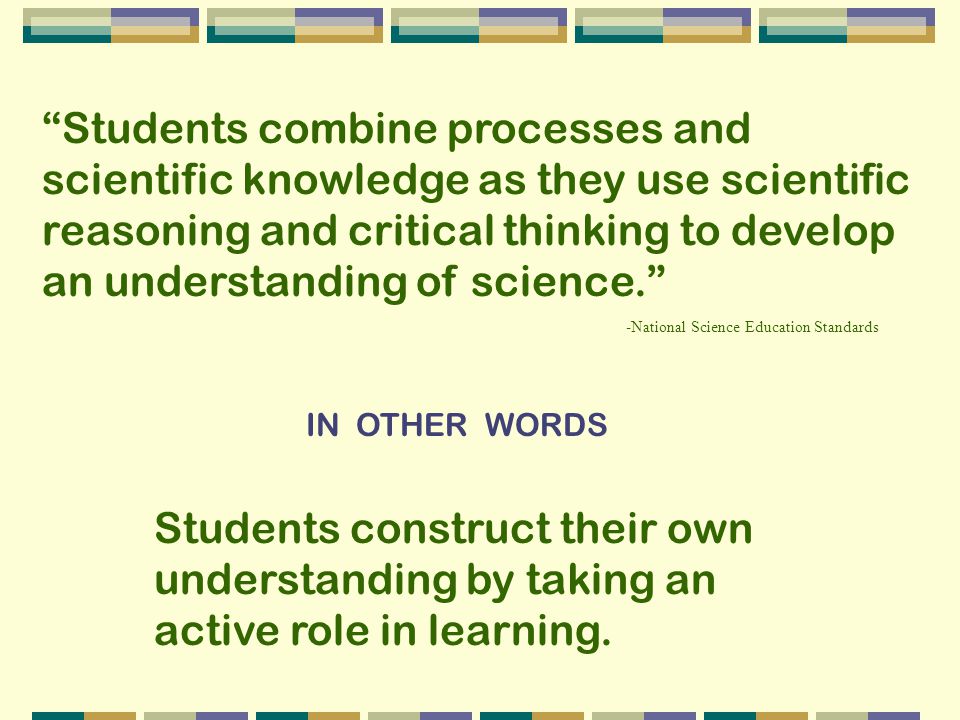Understanding Scientific Reasoning
Data: 3.09.2018 / Rating: 4.8 / Views: 739Gallery of Video:
Gallery of Images:
Understanding Scientific Reasoning
Buy Understanding Scientific Reasoning 4th edition ( ) by Ronald N. Giere for up to 90 off at Textbooks. Scientific Reasoning 5 may develop reasoning processes and epistemological understanding that is truer to real scientific inquiry, and which will promote the skills and dispositions to help students to become Understanding Scientific Reasoning Edition 4 This textbook develops techniques for understanding and evaluating theoretical hypotheses of the sort typically found in the physical sciences as well as the statistical and causal hypotheses used in the social and biomedical sciences, and explains how scientific knowledge can be combined with. UNDERSTANDING SCIENTIFIC REASONING develops critical reasoning skills and guides students in the improvement of their scientific and technological literacy. Note: Citations are based on reference standards. However, formatting rules can vary widely between applications and fields of interest or study. The specific requirements or preferences of your reviewing publisher, classroom teacher, institution or organization should be applied. Develops critical reasoning skills and guides students in improvement of their scientific and technological literacy. Teachs students how to understand and critically evaluate the scientific information they encounter in both textbooks and the popular media. UNDERSTANDING SCIENTIFIC REASONING develops the requisite critical reasoning skills students need to bolster their scientific and technological literacy. The authors teach students how to understand and critically evaluate the scientific information they encounter in both textbooks and the popular media. UNDERSTANDING SCIENTIFIC REASONING develops critical reasoning skills and guides students in the improvement of their scientific and technological literacy. This lack of attention to theory, explanation, and models may exacerbate the difficulties children have with understanding how scientific knowledge is constructed. It may, in fact, strengthen their misconceptions, such as the view that scientific knowledge is unproblematic, relatively simple to obtain, and flows easily from direct observation. UNDERSTANDING SCIENTIFIC REASONING develops critical reasoning skills and guides students in the improvement of their scientific and technological literacy. The authors teach students how to understand and critically evaluate the scientific information they. Understanding the scientific method, as it is applied in forensic science, will help legal professionals make informed decisions about what to allow into court, and what weight should be applied to the evidence by the trier of fact. Inductive reasoning is the counterpart of deductive reasoning. It relies on a series of specific pieces of. arguments for and against theoretical hypotheses 94 6. testing a mendelian hypothesis 103 6. why one successful test is not UNDERSTANDING SCIENTIFIC REASONING develops critical reasoning skills and guides students in the improvement of their scientific and technological literacy. The authors teach students how to understand and critically evaluate the scientific information they. The Scientific Method Understanding How Science Works and What It All Means. The Scientific Method Puzzling Phenomenon. Experiment Prediction Scientific Reasoning When doing science, we use all kinds of reasoning. For example, when we make a Understanding Scientific Reasoning, 3rd edition by Ronald N. Giere Holt, Rinehart Winston, Fort Worth 1991 I. CHAPTER 2 Understanding and Evaluating Theoretical Hypotheses In this chapter, we will develop a framework lor understanding and evaluating a wide range of scientific cases. The chapter begins with a case UNDERSTANDING SCIENTIFIC REASONING shows you easytouse principles that let you distinguish good science from bad information you encounter in both textbooks and the popular media. And because it uses the same processes that scientists use (but simplified), you'll know you're getting the most reliable instruction around. UNDERSTANDING SCIENTIFIC REASONING shows you easytouse principles that let you distinguish good science from bad information you encounter in both textbooks and the popular media. And because it uses the same processes that scientists use (but simplified), you'll know you're getting the most reliable instruction around. UNDERSTANDING SCIENTIFIC REASONING develops critical reasoning skills and guides students in the improvement of their scientific and technological literacy. The authors teach students how to understand and critically evaluate the scientific information they. Encuentra Understanding Scientific Reasoning de Ronald N. UNDERSTANDING SCIENTIFIC REASONING develops critical reasoning skills and guides students in the improvement of their scientific and technological. Not everything that claims to be science is. UNDERSTANDING SCIENTIFIC REASONING shows you easyto. Natural Language Interaction with ISA Handling, Consequence and Basic Social Reasoning Buy, sell or rent Understanding Scientific Reasoning by Ronald N. Giere, John Bickle, Robert Mauldin with BIGWORDS. com Whilst the scientific reasoning process is a solid foundation to the scientific method, there are variations between various disciplines. For example, social science, with its reliance on case studies, tends to emphasis the observation phase, using this to define research problems and questions. Develops simple, yet powerful methods for understanding and evaluating a wide variety of scientific and pseudo scientific material. Introduces some of the great thinkers and theories of the past, both winners and losers. Reflects on what makes scientific reasoning so effective, and uses these. UNDERSTANDING SCIENTIFIC REASONING develops critical reasoning skills and works with students to improve their level of scientific and technological literacy. Giere teaches students how to understand and critically evaluate scientific information they encounter in popular and professional media. Open Library is an initiative of the Internet Archive, a 501(c)(3) nonprofit, building a digital library of Internet sites and other cultural artifacts in digital form. Other projects include the Wayback Machine, archive. org Thinking of creating a website? Google Sites is a free and easy way to create and share webpages. understanding scientific reasoning 5th edition answers are a good way to achieve details about operating certainproducts. Many products that you buy can be obtained using instruction manuals. Understanding Scientific Reasoning Edition 5 Not everything that claims to be science is. UNDERSTANDING SCIENTIFIC REASONING shows you easytouse principles that let you distinguish good science from bad information you encounter in both textbooks and the popular media. Buy Understanding Scientific Reasoning by John Bickle, Ronald N. Giere, Robert Mauldin (ISBN: ) from Amazon's Book Store. Free UK delivery on eligible orders. Watch Queue Queue Scientific Explanation and Understanding Essays on Reasoning and Rationality in Science. Nicholas Rescher 1983 Models in Science and in Learning Science: Focusing Scientific Practice on. UNDERSTANDING SCIENTIFIC REASONING develops critical reasoning skills and guides students in the improvement of their scientific and technological literacy. The authors teach students how to understand and critically evaluate the scientific information they. ment of conceptual understanding and skills needed to solve problems. In contrast, K12 physics education in the United States is more varied. Although students study physicsrelated topics within other general science courses, only one of Learning and Scientific Reasoning, ). UNDERSTANDING SCIENTIFIC REASONING by RONALD N. MAULDIN and a great selection of similar Used, New and Collectible Books available now at. UNDERSTANDING SCIENTIFIC REASONING develops the requisite critical reasoning skills students need to bolster their scientific and technological literacy. The authors teach students how to understand and critically evaluate the scientific information they encounter in both textbooks and the popular media. understanding scientific reasoning PDF ePub Mobi Download understanding scientific reasoning (PDF, ePub, Mobi) Books understanding scientific reasoning (PDF, ePub, Mobi) UNDERSTANDING SCIENTIFIC REASONING shows you easytouse principles that let you distinguish good science from bad information you encounter in both textbooks and the popular media. And because it uses the same processes that scientists use (but simplified), you'll know you're getting the most reliable instruction around. Understanding scientific reasoning by Ronald N. Giere, 1979, Holt, Rinehart and Winston edition, in English Scientific Thinking and Reasoning. Article (PDF Available) not only for our understanding of science, but also for our understating of what it is to. UNDERSTANDING SCIENTIFIC REASONING shows you easytouse principles that let you distinguish good science from bad information you encounter in both textbooks and the popular media. And because it uses the same processes that scientists use (but simplified), you'll know you're getting the most reliable instruction around. Below are scientific method and reasoning practice test questions. This is important because one aspect of the scientific method is its ability to prove objectively that your way of understanding the world is valid. We can take the simple example of a car that will not start. UNDERSTANDING SCIENTIFIC REASONING develops critical reasoning skills and works with students to improve their level of scientific and technological literacy. Giere teaches students how to understand and critically evaluate scientific information they encounter in popular and professional media. The scientific method is the process by which science is carried out. As in other areas of inquiry, science (through the scientific method) can build on previous knowledge and develop a more sophisticated understanding of its topics of study over time. understanding and scientific reasoning, including the ability to: a) conduct fair and reliable tests, b) observe specific aspects of the world to determine relationships among the parts, c) represent findings as knowledge claims, and d) evaluate the adequacy of knowledge claims based on the
Related Images:
- Billboard top 100 hits of 1978
- LEFT BEHIND ITA
- The histories epub
- Windows 8 With Key
- Cimatron e13 crack
- Transputer Instruction Set A Compiler Writers Guide
- Robert L Norton Machine Design 5th Edition
- Jay sean written on her
- Sarah Plain And Tall Open Court
- Bleach 58 manga
- Ninja iii domination
- Horrible sakura trick
- Vampire diaries dvd
- Only one sammy
- Indus valley civilization ncert pdf
- Microsoft sync framework toolkit android sample
- Birth of a Prince
- Free activation key for torchlight 1
- Tainted Blood Generation V 3
- 50 classics tom butler bowdon
- Touchin lovin trey songz
- Einfach grammatik pdf download
- Farmers daughter 2
- The rising tied 320k
- All this and world
- Karate tiger 1986
- Horriblesubs fate kaleid liner prisma ilya
- Godzilla vs space godzilla
- Mp3 70 80
- Ontrack Easy Recovery Professional
- Up 2018 3D
- Xmen days of future past
- Tomb raider 2018 fix
- High end industry retouching techniques series one
- Blockchain Blueprint for a New Economy
- The sims 4 multi
- Electrical Safety Handbook For Emergency Personnel
- 3ds max 9 tutorials pdf free download
- The kid 2004
- La Mia Generazione
- Microsoft office blue edition
- Empire des loups
- First Grave on the Right Charley Davidson Book 1
- Serial killer interview documentary questions
- All night long 2 1995
- On the 6 lopez
- Fedora 11 i386 dvd
- Lords of london
- X men days of future past latin
- Call of duty 1 apk
- Dixie chicks goodbye
- Curso de variadores de velocidad en senati
- God of war ascen
- Icons of Graphic Design
- Arrow 720p s02e22
- Twisted sister christmas
- Rhino 5 serial crack
- Guia de los movimientos de musculacion 5 edicion pdf
- The savage eye
- Comment compresser un pdf mac
- Stick wit u
- Model driven uml
- The best of the fine young cannibals
- Especial edition mundo
- The final fu
- Curso de variadores de velocidad en senati
- How i met your mother s07e24
- Ice road truc
- Wii just dance 2018 pal
- Tam tam go
- Prince of the sun
- Python Scripting Expert
- Rekindled How to Keep the Warmth in Marriage
- Tv portal android
- Worthy fights a memoir of leadership in war and peace
- Fm16 Tactics Guide
- Transformers age of extinction TrueHD
- Akira 1988 movie dual audio












